Related Research Articles

Marcelino Menéndez y Pelayo was a Spanish scholar, historian and literary critic. Even though his main interest was the history of ideas, and Hispanic philology in general, he also cultivated poetry, translation and philosophy. He was nominated for the Nobel Prize in Literature five times.
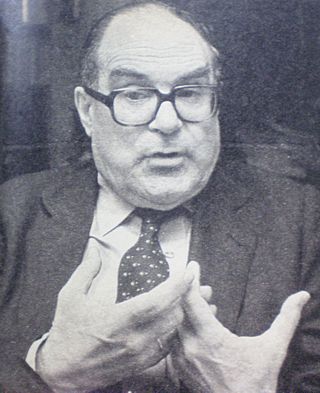
Julián Marías Aguilera was a Spanish philosopher associated with the Generation of '36 movement. He was a pupil of the Spanish philosopher José Ortega y Gasset and member of the Madrid School.
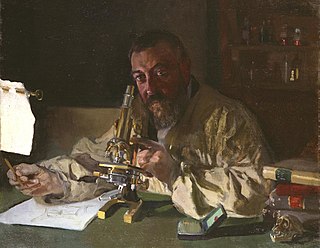
Luis Simarro Lacabra was a Spanish neurologist who was born in Rome while his parents were living in Italy.
Carlos Castrodeza Ruíz de la Cuesta was a Spanish biologist and philosopher. He taught philosophy of science at Madrid's Complutense University.

Gabriel Jackson was an American Hispanist, historian and journalist. He was born in Mount Vernon, New York in 1921. After his retirement he lived in Barcelona, Spain.

Martín Almagro Gorbea is a Spanish prehistorian.
Antonio Domínguez Ortiz was a Spanish historian, one of the leading specialists in the history of the Spanish Antiguo Régimen of the 16th through 18th centuries, in particular in social history. He was also expert historian of Andalusia, with a particular emphasis on the history of the Moriscos.
Felipe Maíllo Salgado. Philologist, historian and Spanish Novelist. Professor of Arabic and Islamic Studies at Salamanca University, accredited as Professor by the Spanish University Council in 2008. Awarded the "María de Maeztu" prize to research excellence by Salamanca University, in 2010.

Enrique García Hernán is a Spanish historian of the culture of early modern Europe. His research examines the interaction of religious sentiment, political thought and international relations in the sixteenth, seventeenth and eighteenth centuries. It attempts to bridge the gap between the study of forms of cultural and intellectual expression and the realities of political, diplomatic and military organization. He is a Corresponding Fellow of the Royal Academy of History, member of the Board of Directors (Vocal) of the Spanish Commission for Military History, and Fellow (Académico) of the Ambrosiana Academy of Milan. His current academic affiliation is as a research professor in the Institute of History, within the Center for Humanities and Social Sciences at the Spanish National Research Council. The Spanish National Research Council is the largest public institution dedicated to research in Spain and the third largest in Europe.

Joaquín Yarza Luaces was a Spanish art historian. Professor Yarza began his professional career in Madrid. He began his work as a teacher in Barcelona in 1974, where he later died. Since then, he has been a guide to medieval studies with special prominence in Renaissance subjects.
Jerónimo Cortés was a Spanish mathematician, astronomer, naturalist and Valencian compiler.

José Solís Ruiz was a Spanish politician, known for his role in Francoist Spain, during which he occupied a number of important posts.

Eduardo González Calleja is a Spanish historian, professor of Contemporary History at the Charles III University of Madrid (UC3M). He is the author of a long list of scholar works dealing with political violence.

Ángel Viñas Martín is a Spanish economist and historian. He has published many works dealing with the Spanish Civil War focusing on the war finance as well as the international relations aspects of the conflict.
José Luis Rodríguez Jiménez is a Spanish historian, considered an expert in the history of the right-wing extremism in Spain.
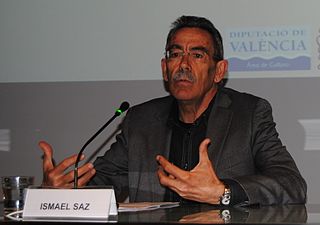
Ismael Saz Campos is a Spanish historian, specialised in the study of Falangism, Francoist Spain and the Spanish-Italian relations during the Spanish Civil War. He is a professor at the University of Valencia.

Javier Moreno Luzón is a Spanish historian, professor of the History of Thought and Social and Political Movements at the Complutense University of Madrid. He is an expert in the political history of Restoration Spain.
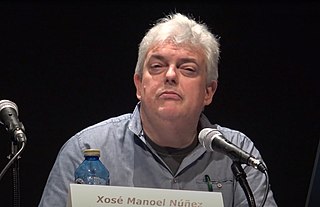
Xosé Manoel Núñez Seixas is a Spanish historian who specializes in nationalism studies, the cultural history of war and violence, and migration studies.
Julio Aróstegui Sánchez (1939–2013) was a Spanish historian. Professor at the Complutense University of Madrid (UCM), some of his research lines included the study of political violence in Modern Spanish history, Carlism, the Spanish Transition, the Spanish Civil War, the history of the workers' movement and collective memory. His scholar production also intertwined with the theoretical problems of history and the methodology of research.
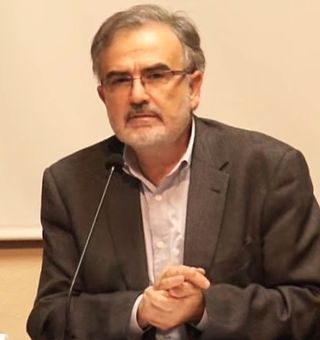
José Antonio Piqueras Arenas is a Spanish historian. Professor of Contemporary History of the Jaume I University (UJI), his research lines focus on the study of social relations and political attitudes. Among other topics, his academic production has dealt with the history of the labour movement, slavery, 19th-century Spanish history, and the history of Cuba and the Antilles.
References
- Boston University, "Professor Thomas F. Glick". https://web.archive.org/web/20071018204413/http://www.bu.edu/history/glick/glickindex.html.
- Texas Archival Resources Online, "A Guide to the Thomas F. Glick Papers" The Center for American History. http://www.lib.utexas.edu/taro/utcah/00094/cah-00094.html.